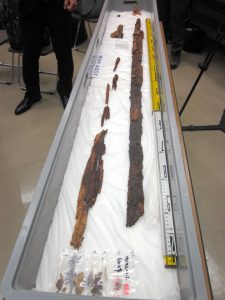Specialist analysis of two swords found in an early 6th century tombs in the Shimauchi district, southern Kyushu, Japan, revealed both being historic findings.

The swords have been found in an underground tunnel tomb (designated no. 139) at a burial site, which was excavated between 2014-2015. The swords were placed by the side of skeletal remains found within the tomb. Both the individual and the weapons show high social status. The Gangoji Institute for Research of Cultural Property from Nara performed conservation work and as scientific analysis of the swords. Excavations of the tomb, fashioned in a style unique to Miyazaki and Kagoshima prefectures and to the Kofun Period, revealed also other valuable items such as armour, weapons, and horse harnesses.

The process revealed that the remains of one of the the sword are 142 cm long. The experts suspect that originally it would be about 150 cm long, making it the longest sword ever excavated from an ancient tomb in Japan. Moreover, a valuable textile called “tatenishiki“, or warp-patterned brocade, was used to cover around the opening of the scabbard, and only 4 such luxurious textiles from the same time period had previously been discovered in Japan. The other sword is about 85 centimetres long, ornamented with a round silver-decorated pommel. Its hilt is covered with a granular ray skin. It is supposedly the oldest example of ray skin-craft found in East Asia. The longest sword is believed being a gift from the Yamato kingdom, while the latter is thought to have been made in the ancient Paekche kingdom of the Korean Peninsula.
(after The Asahi Shimbun)